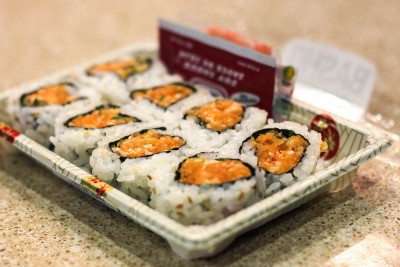The Gulf of Maine Research Institute is pushing for New England universities to put more regional seafood in dining halls using its label, which identifies the seafood as sustainable and coming from the Gulf of Maine.

Regional supermarkets such as Shaw’s and Hannaford have been committed to promoting the institute’s label, said Kyle Foley, the institute’s Sustainable Seafood Brand Manager.
Foley said universities are an exciting opportunity for the company because students tend to be more interested than the general public regarding the origin of their food, she said.
“Universities have a chance to put some of these species in front of an engaged audience and let students give them a try in the dining halls,” Foley said. “Then when they all go out into the world and go grocery shopping, we hope the students will then have a better sense of what’s available out there and can help move the demand for some of these species by being really interested consumers.”
Foley said 91 percent of all seafood in the United States is imported from other countries. In its efforts, Foley said the institute has concentrated its efforts on working with five “underutilized” species: Red Fish, Dogfish, Atlantic Pollock, Mackerel and Whiting.
The institute hosts educational events to promote more regional seafood availability in local stores and university dining halls. Many northeastern colleges and universities, including Boston University, attended the last GMRI event in November 2014.
“We have spoken to BU, and there are things that have to happen behind the scenes, but we know they have considered the program,” Foley said. “And we would like to see them participate in the future.”
Boston University Sustainability Coordinator Sabrina Pashtan wrote in an email that the school already supports local, sustainable seafood, but is looking into the different species GMRI can provide.
Each Friday in the Boston University dining halls, a “catch of the day” is served, which gives students an opportunity to enjoy fresh and sustainable New England seafood, she said.
“We display the species name, the port where the fish was landed, the fisherman’s name and the name of the vessel. This gives students an opportunity to know exactly where their seafood is coming from,” she said. “BU Dining Services supports local, sustainable seafood through its partnership with Red’s Best, which purchases seafood on a daily basis from small, day-boat fishermen between Maine and Cape Cod.”
Students can look for further details with the Monterey Bay Aquarium’s Seafood Watch app using the information provided at the dining hall station, Pashtan said.
Foley said BU is just one of the many potential universities GMRI is hoping to expand their sustainable seafood label with.
Less well-known and less popular species tend to get over looked and are under-utilized, Foley said.
“That’s a lot of money left in the water by the fishing industry, and we think that there’s huge opportunity there, especially when a lot of the industry is struggling right now,” Foley said.
Several residents said they would like to have a label that ensures that their fish is obtained locally and that they would be more inclined to buy from major retailers if they carried it.
Carl Louis, 26, of Allston, said he would prefer to buy fish locally than at a chain store like Shaw’s, but if the supermarket had a label distinguishing it as local, he wouldn’t mind.
“I would rather buy my fish from somewhere local than the Shaw’s down the street,” he said. “It [the label] would have to show me where my fish was from.”
Alex Krinsky, 21, of Allston, said importing is not the issue, but rather the location the fish are being imported from.
“Personally, I don’t really care if my seafood is imported, as long as it is imported in a certain amount of time,” he said. “Knowing the food is local is definitely a selling point. If I know it is coming from somewhere close, I associate that with the freshness of the fish and would be more inclined to buy it.
Harry Meltzer, 21, of Allston, said he was in favor of buying local fish because of the benefits for businesses.
“I have absolutely seen labels like that. I just looked at one the other day. I’m all for it, and I think it’s a win-win,” he said. “It improves U.S. businesses and reduces how much we depend on foreign trade and foreign prices while also bringing us healthier and fresher fish.”





















































































































